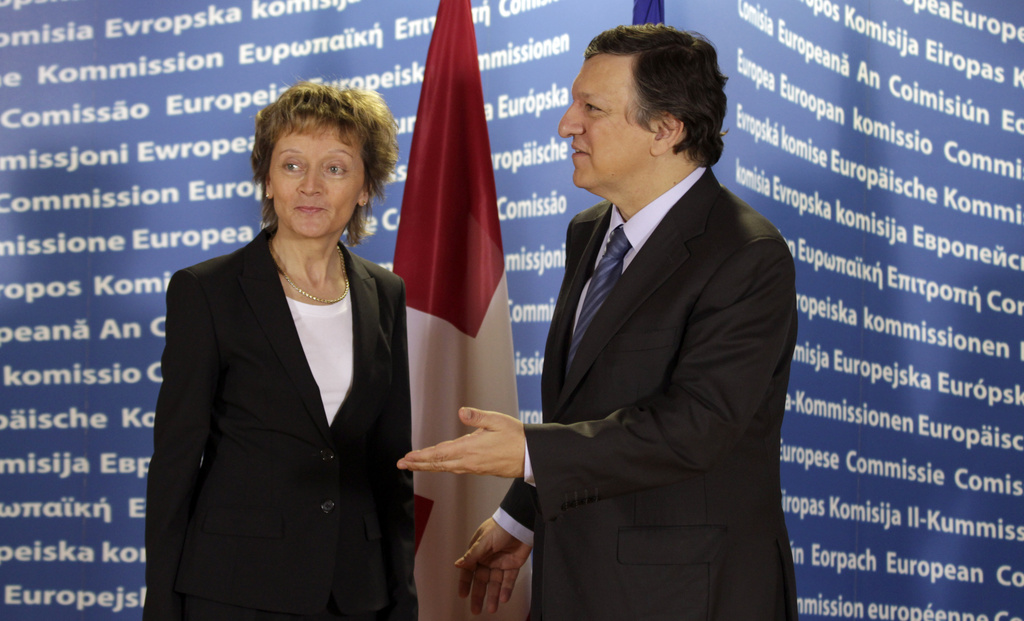Revised British tax deal re-opens battle front

A modified tax deal between Switzerland and Britain has revived Swiss hopes that it could provide a platform to save banking secrecy.
But while the patched up treaty has overcome legal objections from the European Commission (EC), observers warn that generous loopholes could soon be plugged or that it could yet be torpedoed altogether.
The so-called Rubik treaty is Switzerland’s answer to mounting calls from the EC for an automatic exchange of tax information, that would blow banking secrecy out of the water.
In exchange for cloaking the identity of offshore account holders, Rubik promises to pay compensation for past tax dodging and compel banks to cream off a withholding tax on the future profits of client assets.
Rubik deals with Britain and Germany were agreed last year, only for the EC to threaten legal action because they infringed the Savings Directive – an existing agreement for Swiss banks to levy withholding taxes on the accounts of European Union clients.
On Tuesday, a revamped British Rubik deal was unveiled that would only collect taxes on profits not covered by the directive. Taxes on interest income would continue to funnel through the EU directive, while a range of other profits would be covered by Rubik.
“Core principle conflict”
Value added tax (VAT) was excluded from the British Rubik deal while an inheritance tax loophole was closed.
But the deal comes with a clause stipulating that the payment of withholding taxes fulfil the tax obligations of Swiss banking clients once and for all. In other words, it would completely block further demands for an automatic exchange of information.
Some experts believe that the EC could still baulk at this clause and put up more resistance to the treaty. “It is an obvious conflict with the core principle of the EU savings tax [that contains no such provision],” Zurich-based tax consultant and Savings Directive expert Mark Morris told swissinfo.ch.
But Dieter Freiburghaus, emeritus professor of the Swiss Graduate School of Public Administration, is confident that the treaty will still pass despite possible objections.
“The EC could still raise objections to the finality clause,” he told swissinfo.ch. “The EC still wants an automatic exchange of information in the long run, but it will have to accept this revised treaty.”
“The fact is that many states urgently need money so pragmatism will have to take precedence over idealism.”
Rewarding cheats
The EC is making no comment until it has digested the revised Rubik treaty. But even if it grudgingly agrees, there is no guarantee that the treaty would be rubber stamped by the British parliament.
Earlier this month a parliamentary sub-committee gave a damning report on the proposed deal, fearing that it would “reward those who have deliberately avoided tax over those who have not”.
“We are concerned that the levies on Swiss bank accounts will result in those who have sought to avoid tax by concealing their assets offshore receiving far more favourable tax treatment than those who were compliant in the first place,” the committee concluded.
A similar Rubik treaty with Germany has also run into political opposition, leading to calls for Switzerland to renegotiate terms.
Another criticism of the British treaty is that it contains too many glaring loopholes to come anywhere near achieving its ambition of raising £4-7 billion (SFr5.8-10 billion) in tax income.
Vital importance
Pressure group Tax Justice Network has labelled the deal a “Swiss cheese riddled with holes” most notably for turning a blind eye to discretionary trust funds. Such vehicles hide the identity of beneficiaries, making it impossible to know who to tax.
“Anyone could bypass the whole Rubik system by setting up a $500 discretionary trust fund in Panama and still remain tax compliant,” Morris told swissinfo.ch, pinpointing other weak spots surrounding specialised insurance schemes and tax deferred products.
But tax dodgers will not have it all their own way, according to Morris. A package of amendments will plug the same gaping holes in the Savings Directive – once they get past obstinate objections from EU member states Austria and Luxembourg.
“Until Tuesday [when the British treaty was updated], the Rubik system was responsible for paying tax on interest earnings. Now this comes under the Savings Directive and the amendments will close a lot of loopholes,” Morris said.
Added to that, the definition of interest earnings will also be tightened up in the directive. This could suck away further taxable revenues currently covered by the Rubik deal.
“The amendments will eat into the Rubik system until it is a hollow shell,” Morris predicted.
The success of the Rubik treaty is of vital importance to the Swiss financial sector. If the British scheme can be passed and implemented by the start of next year, other countries such as Greece could soon start negotiating for their own deals.
The Rubik principle was devised by the Association of Foreign Banks in Switzerland.
The project wants to separate income from wealth and hand over tax at source to third countries, while keeping the Swiss bank account holder’s anonymity.
The inventors say this strategy will also afford more protection to foreign bank employees in Switzerland from legal action by third countries.
It is hoped that guaranteed anonymity will encourage foreigners with assets being managed in Swiss banks not to take them away.
Switzerland agreed to withholding tax deals with Germany in August and Britain in October that preserve banking secrecy.
Where applicable, a lump sum tax payable on deposited capital will be taken by the banks and transferred anonymously to taxation authorities in Britain and Germany. The rate of taxation will vary between 19 and 34 per cent depending on the size of assets and how long they have been undeclared in Swiss banks.
For future taxes, the British deal has been modified. Taxes levied on interest earnings will now be funneled through the EU Savings Directive at a rate of 48% (35% as the standard EU rate plus an extra 13% demanded by Britain).
The Rubik treaty will raise withholding taxes at a rate of 40% for dividends, 27% for capital gains and 48% for other income.

In compliance with the JTI standards
More: SWI swissinfo.ch certified by the Journalism Trust Initiative










You can find an overview of ongoing debates with our journalists here . Please join us!
If you want to start a conversation about a topic raised in this article or want to report factual errors, email us at english@swissinfo.ch.